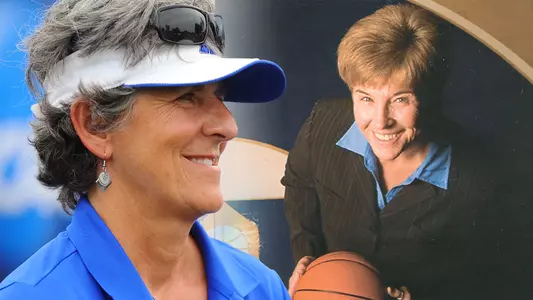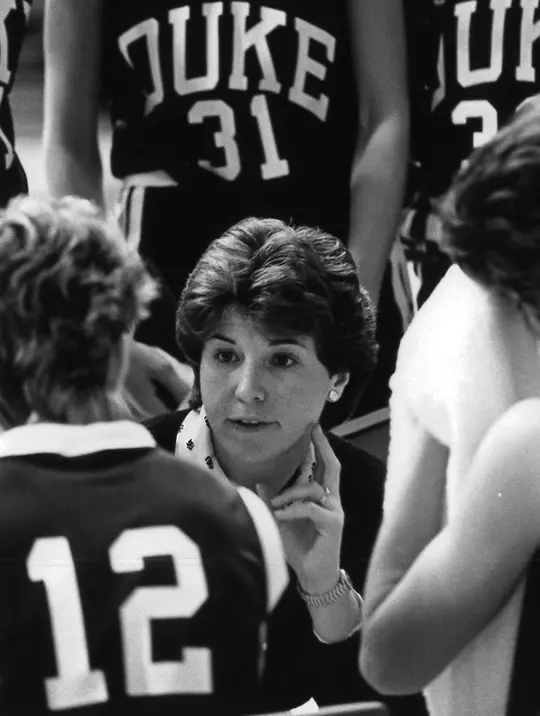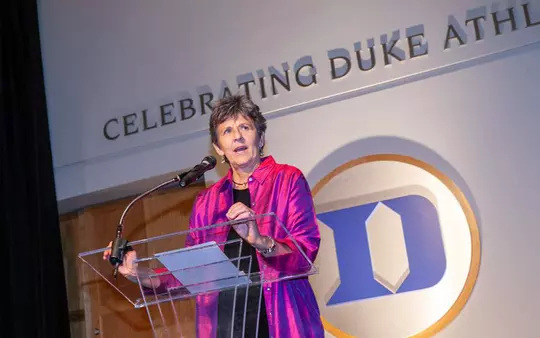Upcoming Event: Men's Basketball at Army West Point on November 11, 2025 at 7 p.m.











6/23/2022 12:23:00 PM | Athletics
Leonard and Silar Helped Set the Table for Duke Women
It’s fair to say that Duke dipped its toes into the Title IX pool with some caution. By the time the university hired Debbie Leonard in 1977 to be the school’s first fulltime women’s basketball coach, Duke was already playing catchup to better-funded ACC rivals such as N.C. State (Kay Yow), Maryland (Chris Weller) and Virginia (Debbie Ryan replacing Dan Bonner).
Duke did have a women’s basketball team prior to Leonard, but only in the broadest possible terms. The school had what were essentially club teams in the early 1970s. P.E. instructors Calla Raynor and Emma Jean Howard served as head coaches for basketball (and other sports such as volleyball and tennis) during the first five “varsity” hoops seasons.
Leonard grew up in Welcome, N.C. She starred in basketball at North Davidson High School, the first time she ever had an opportunity to play organized sports.
“When I was growing up I was the best pitcher for a long time,” she recalled recently. “At recess some of us girls would play with boys and would see them play Little League and things like that and sure I wanted to play. But I just had to deal with the fact that it just wasn’t going to happen.”
Leonard received an academic scholarship to attend nearby High Point College. Even prior to Title IX, there was an attempt to organize women’s college athletics under the control of the Association for Intercollegiate Athletics for Women (AIAW). Until losing some court cases, the AIAW didn’t allow recruiting. So Leonard received a letter from basketball coach Betty Jo Clary inviting her to join the basketball team after she had matriculated. She also picked up field hockey and became a standout in that sport.
Once Title IX became law, Leonard says she saw coaching in her future. After graduating from High Point in 1974 she taught in public schools to save up for graduate school at UNC-Greensboro, where she had a brief stint as a grad assistant.
Leonard grew up a Duke fan and was very interested when Duke athletic director Carl James decided the school needed to get serious about women’s basketball.

But she went into it with her eyes wide open.
“I came down to Durham and interviewed with Carl James in May of 1977,” she said. “I really liked him and all the answers to my questions were right on because he literally told me that what they were doing at N.C. State is what we were going to be doing at Duke. I knew I was young but wow this is going to be quite a challenge. But I was ready for it mainly because I just loved Duke so much.”
She was 25.
“It was quite a surprise when I got a phone call later in the summer that said, ‘Hey, you need to come up to Durham and meet the new athletic director.’”
That was Tom Butters, who replaced James and guided the department to much success over his 20 years in the job.
Butters passed away in 2016. Former basketball standout Steve Vacendak was Butters’ associate AD and he gives some insight into resource allocation during those early years of women’s athletics.
“The transition and the implementation of Title IX was at best a really bumpy ride for everybody across the country. I don’t think anybody had a smooth transition because there were so many unknowns as to what you could do and how you could come into compliance with some of the objectives. The revenue stream wasn’t perfect. Basketball attendance was low and there was no TV contract. And then superimposed on all that was the need to do the best you could with what you had until you could get through that transition period.
“I don’t think were very many coaches who were satisfied, who didn’t think they needed more resources. That was across the board, men’s and women’s coaches, because the revenue just wasn’t there.”
It certainly wasn’t there for Leonard, who spent her entire tenure at Duke fighting for a bigger piece of the pie.
During her first season, Duke went 1-19 and lost 10 games by at least 25 points, including a 103-39 drubbing against Maryland in the first ACC women’s basketball tournament.
The learning curve was steep. Leonard had a few scholarships to work with.
“It was a rather difficult time to be told that you were going to be getting everything Kay [Yow] was getting at N.C. State and then all of a sudden you have no scholarships and your budget is $800 for the year. I had to acclimate myself to the Duke process, the application process, which was very rigorous for the players I was recruiting, perhaps more rigorous than any of the other schools I was recruiting against. And how I got student aid. What am I going to be telling them, how am I going to be able to get them some financial aid?”
But she was able to upgrade the roster in a hurry. One of her first big additions was Barb Krause, a 5-10 forward from Maine who played one year at Bowdoin before transferring to Duke.
“I reached out to a number of schools,” Krause said. “Education and basketball were my focus.”
Krause came in and averaged 15 points and 11 rebounds as Duke went 11-11 in 1979, Leonard’s second season.
Krause says she noticed the shortfalls in the program, citing “travel, clothing and shoes, weight-room access, training table and support staff.”
But the cash flow improved as Butters’ Iron Dukes program matured and Leonard got more resources, albeit not as much as the competition. High Point teammate Jacki Silar came in as a volunteer assistant for a season before becoming Duke’s first paid assistant. Leonard brought in ACC-level talent like Stacy Hurd, Jennifer Chestnut and Connie Goins. But according to Silar, Leonard was Duke’s secret weapon.
“Debbie was a helluva coach,” Silar said. “Xs and Os, she got it. She outsmarted [opposing coaches]. Our kids were so smart that she could play different defenses all the time and those people would be going ‘What’s going on?’ She would change up defenses all the time and that sort of thing was magical.”
“We fought hard. Effort mattered. Our team never counted itself out,” added Krause.
During Krause’s junior year, 1979-80, Duke posted its first winning record and picked up milestone victories with the first program wins over North Carolina and Virginia. The first ACC Tournament win, 81-76 over Clemson, came in 1985. Duke made the WNIT in 1986, beating West Texas State, for the first postseason win in school history.
Leonard says that first win over the Tar Heels is her career highlight.
Hired with the mandate of making Duke competitive Leonard passed that threshold with room to spare. Duke went 59-27 in a three-year span in the middle 1980s, including the school’s first 20-win season in 1986. Chris Moreland became Duke’s first first-team All-ACC player in 1986; she repeated in 1987, the same year she and wing Katie Meier led Duke to its first NCAA Tournament. Duke defeated Manhattan in Durham before losing to Rutgers in New Jersey.
But Leonard still felt like she was fighting rear-guard battles she wasn’t going to win.
“We definitely got more financial support although to be honest it wasn’t what it should have been. In terms of emotional support and respect, not so much. Never felt very respected.”

Silar, who also served as head coach of the field hockey program for 15 years and became Duke’s first senior women’s administrator, offers a distinctive perspective.
“Debbie fought the fight and she was determined to make it better at Duke, and she did. And she fought it all the time because they weren’t just saying, ‘Oh, you can have this.’ You had to ask for everything and most of the time you had to ask more than once and you were lucky if you got it.”
Still, as Vacendak noted, Leonard lasted 15 years, so the relationship worked.
But the program had leveled off by the early 1990s.
“It was an accumulation of things,” Leonard recalled. “It was time. There was going to have to be a change. Essentially he fired me. That’s fine. At that point in time I needed to be gone. When I left, Gail [Goestenkors] got three times my salary, three times my budget, three times my everything and that’s exactly what should have happened.”
Leonard landed on her feet.
“I think God handled things or allowed me to handle things and they just fell into place with State Farm [Insurance]. They were really big into women’s basketball and they kind of liked that I was a former basketball coach.”
Kay Yow gave Leonard a chance to work with her radio show, which led to TV analyst spots with Home Team Sports, then ESPN.
Goestenkors took Duke places Leonard couldn’t. But there’s little doubt that Leonard set the stage.
“The real highlight was the kids, the human beings, the women that went through my program and you look at them and what they’re doing with their lives, it’s phenomenal.”
It should be noted that every player Leonard recruited graduated.
Silar’s thoughts?
“Pioneer is an interesting word. I would like to think of us as making a difference. For us it was an opportunity to build something, to make something happen at a great university and that’s what we were doing. We were building something, most of the time buying our own bricks and mortar. Thank God for Title IX. It was a good thing and it really enhanced what women were able to do.”
Krause, who went to law school at Cornell and served as deputy legal counsel for Appalachian State, says we shouldn’t look at Title IX as something that happened long ago, noting there is still work to do to reach 100 percent compliance. She would like to see Duke say, “We’re going to be a national leader in this regard.”
Dedicated to sharing the stories of Duke student-athletes, present and past, GoDuke the Magazine is published by LEARFIELD with editorial offices at 3100 Tower Blvd., Suite 404, Durham, NC 27707.